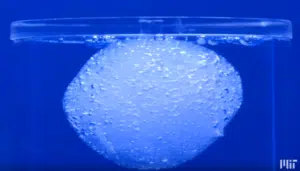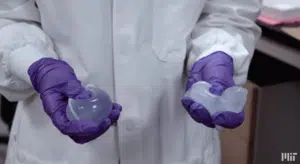Novel Hydrogel Biomaterial Can Track Diseases and Deliver Drugs
A team of MIT engineers designed an indigestible, expanding pill that can monitor the stomach for up to a month, potentially track cancers and GI conditions and deliver drugs.
The 3D hydrogel design is remarkably absorbent, tough, and stretchy. Its fabricated with two types of hydrogels. This combination enables the pill to quickly swell while remaining resistant to the stomach’s acidic environment.
If the pill needs to be removed, one can simply drink a solution of calcium ions containing more calcium than whole milk. This triggers the pill to quickly shrink back to its original size and pass safely out of the body.
Credit: Massachusetts Institute of Technology (MIT)
This hydrogel design is softer, more bio-compatible and longer lasting than current indigestible sensors, typically made of hard plastics or metals which are quite stiff in comparison to the gastrointestinal tract.
The inner material of the design are super absorbent hydrogel particles that are used in commercial products such as diapers for their ability to soak up liquid quickly.
The second protective hydrogel layer was designed to encapsulate the fast swelling particles. The outer membrane is made from a multitude of nanoscopic crystalline chains, each folded over another in a nearly impenetrable gridlock pattern.
Credit: Massachusetts Institute of Technology (MIT)
To test the inflatability of the design, researchers dumped the material in various solutions of water and fluid resembling gastric juices. They found the pill inflated up to a hundred times its original size in about 15 minutes, much faster than existing expandable hydrogels.
To test the pill’s toughness, the researchers mechanically squeezed it thousands of times at forces greater than the pill would ever experience for regular contractions in the stomach.
They found the design is both soft like tofu or jello but extremely robust.
Finally, to show their ability to track environmental changes in the stomach, the researchers embedded within their design a small commercial temperature sensor which allows them to accurately and remotely track activity patterns within the body for up to 30 days.
Down the road, the researchers envision the pill may safely deliver a number of different sensors to the stomach to monitor for instance pH levels or signs of certain bacteria for viruses. Tiny cameras may also be able to be embedded into the design to image the progress of tumors or ulcers over time.






